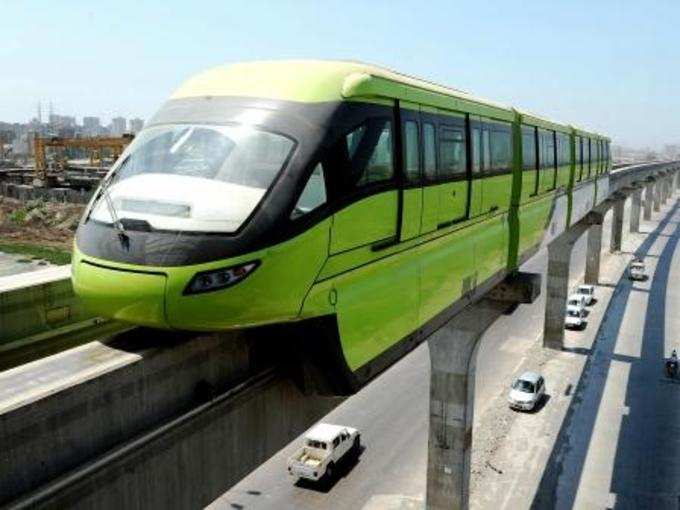
Forget the metro or the latest speed giants roaring across Indian roads. Come Saturday (February 1) and India’s financial capital will be rolling out the country’s first-ever
monorail, connecting the central suburb of
Wadala to
Chembur on the eastern outskirts of Mumbai and covering a distance of 8.93 km across seven stations in about 21 minutes. Currently, it takes around 40 minutes to cover this stretch.
Mumbai monorail will be formally inaugurated by
Maharashtra Chief Minister Prithviraj Chavan on Saturday afternoon and the commute will be open for the masses from Sunday onwards. The two-phase project costs around Rs 3,000 crore and the second phase linking Wadala to
Sant Gadge Maharaj Chowk (popularly known as
Saath Rasta and originally called
Jacob’s Circle) in south Mumbai will be operational within a year.
As of now, tickets are priced between Rs 5 and Rs 11 and a
smart card system is already in place, but there will be no
season pass. The seven stations on the Phase-I route include Chembur,
VN Purav/RC Marg Junction,
Fertilizer Township,
Bharat Petroleum,
Mysore Colony,
Bhakti Park and
Wadala Depot. When the entire corridor starts working, tickets will cost Rs 5-19, across a total of 19 stations.
The monorail project has been executed by engineering major
Larsen & Toubro and Malaysian firm
Scomi Engineering. It is owned and operated by
Mumbai Metropolitan Region Development Authority (
MMRDA), which has already spent Rs 1,900 crore on both the phases. The civil work on the second phase has been completed as well.
Construction for the Chembur-Wadala-Jacob Circle (Sant Gadge Maharaj Chowk) route – a total distance of 19.17 km – started back in 2009 and was scheduled to be completed in April 2011. But the project got delayed for more than 2.5 years and only the
Wadala-Chembur section could be completed in the first phase. With the entire stretch becoming operational, it will be the
world’s second longest monorail corridor, after
Japan’s Osaka Monorail (23.8 km). Apart from Japan, other countries running monorails include
China,
Malaysia, the
US,
Germany and
Australia.
Mumbai monorail is going to be a colourful affair, flaunting green, pink and blue. It will be able to peak to 80 km/hour while the average speed has been set at 65 km/hour. Initially, six trains will run from 7 in the morning till 3 in the afternoon. But from March onwards, it will function 19 hours a day and the train frequency will improve as well – from 15 minutes to nine and finally to three-four minutes. As of now, each train has 4 air-conditioned coaches and can carry as many as 560 passengers. After the second phase is commissioned, there will be 10 more trains with six coaches each and a total of 19 stations.
But will the monorail be an essential part of our daily commute once the novelty wears off? It is bound to bring some much-needed relief to Mumbaikars, struggling to cope with traffic snarls on a daily basis. But to make the good work really effective, the second phase should be completed at the earliest. One also wonders if the authorities will consider starting a
second monorail project in and around Mumbai as was originally planned. Experts feel that the need for an expanded monorail corridor may arise after all the proposed metro rail routes are commissioned and there is further requirement for a seamless
feeder service. And when that happens, the people of Mumbai are bound to have a completely hassle-free commute.
